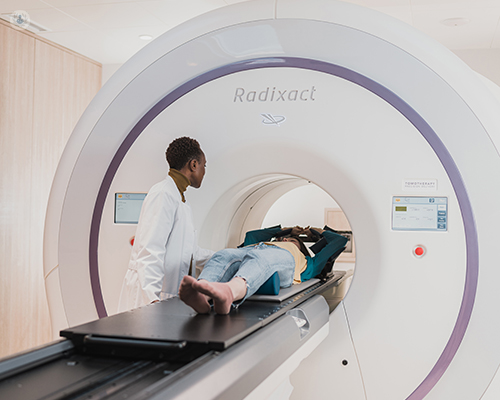Ask an expert: what is a cardiac CT scan?
Written in association with:Leading consultant general and imaging cardiologist Dr Anne Griguer discusses cardiac CT scan, explaining the procedure, what it is used to detect and the differences between a cardiac CT scan and a cardiac MRI scan.
What can a cardiac CT scan detect?
A Cardiac CT Scan is a test used to give a very precise assessment of the coronary arteries.
The test can detect build-up of fatty deposits and calcium in the heart arteries, in order to assess the coronary calcium score, which gives an estimation of the ‘real age’ of the heart arteries.

It can also detect furring or blockages (coronary atheroma). The arteries appear as long and thin white tubes, and calcium appears as very bright spots, while the blockages appear as dark spots or narrowing of the arteries.
A cardiac CT can be beneficial for patients who are suffering from chest symptoms, such as:
- Chest pain
- Shortness of breath
- High colesterol
- Family history of cardiac problems
How long does a cardiac CT take?
Setting up a CT scan takes about 10 minutes, while the scan itself lasts only around 5 minutes.
The set up involves:
- Placing round stickers (electrodes) on the chest, to monitor the heart rhythm throughout the scan.
- Placing a small tube (cannula) in a vein of the arm to administer a contrast agent.
- Giving a spray underneath the tongue to open up the heart arteries (‘GTN’ spray).
- Giving a medication to slow down the heart beat (beta-blockers) if the heart beat is too fast and the patient does not have contra-indication (severe asthma or allergy), to avoid any blurring on the images. These are both short acting medications.
The CT involves taking images before and after giving the contrast agent, in order to look for calcium deposits and blockages in the heart arteries
Do I have to do anything to prepare for a cardiac CT?
It is recommended to avoid any caffeinated drinks before the scan, as we need the heartbeat to be slow in order to produce good images of the heart. A simple blood test is also required prior to the CT, to test for sufficient kidney function. The kidney must be able to function at a high enough leve in order to clear the contrast agent after the scan.
What is the difference between cardiac CT scans and cardiac MRIs?
CT and MRI scans are both tests where the patient lies down on a table and goes through a tunnel where images of the heart are taken.
However, there there are 3 main differences between the two scans:
- The cardiac CT is much quicker and less loud than the MRI, meaning that even someone who is claustrophobic can undergo a CT Scan.
- They use different types of imaging technique: cardiac CT scans use X-ray techniques, whereas cardiac MRIs use magnetic resonance imaging.
- The contrast agent for CT is an iodine based agent, while the one used for cardiac MRI is called gadolinium.
Due to these differences, a cardiac CT is the best imaging technique to look at the heart arteries, whereas a cardiac MRI is better to look at the heart muscle and see how the heart pumps.
How accurate are cardiac CT scans at detecting blocked arteries?
Cardiac CT scan is an extremely sensitive technique which can detect furring or blockages of the arteries. It has the ability to detect even tiny calcium deposits and blockages. It is a wonderful technique as it allows a deeply detailed assessment of the heart arteries without having to put anything inside the arteries.
For this reason, it is referrred to as a ‘non-invasive’ test, as opposed to the ‘invasive’ angiogram, where catheters are placed directly inside the heart.
Are there any disadvantages of cardiac CT scans?
In some cases, the images of the arteries are not clear, either due to movements of the chest during the CT Scan, fast heart beats or a large calcific deposit in the arteries which obscures the lumen of the artery. In such cases, another test may be needed, such as an exercise test or an angiogram.
There is a very small risk of allergy to the contrast agent. As the contrast agent needs to be cleared by the kidneys, patients with very poor kidney function cannot have this test.
However, in general, a cardiac CT scan is an extremely safe and detailed test.
If you woild like to book a cardiac MRI amd would like to book a consultation with Dr Griguer, simply visit her Top Doctors profile today.


